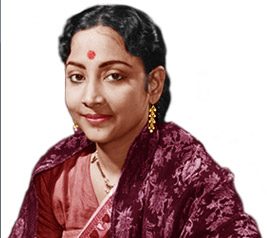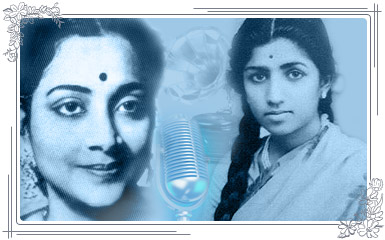Lata Mangeshkar needs no introduction to Indian Music lovers. Her divine voice has enthralled several generations. One of the most popularly known names ever in the world, she was born on September 28, 1929 in Indore, Madhya Pradesh in a family of music. Her father, Dinanath Mangeshkar, owned a theatrical company and was a renowned classical singer. He was a disciple of the Gwalior school of music. Master Dinanath ji gave Lata singing lessons from around the age of five. She also studied with Aman Ali Khan Sahib and later Amanat Khan. Lata Mangeshkar was the unique combination of a God-gifted voice, optimised expression and an unbelievable ability to easily pick up and inherit whatever is taught. Her talent was recognised from an early age itself. When her father died in 1942, Lata being the eldest child was responsible for being the bread winner of the family. Between 1942 and 1948 she acted in as many as 8 films in Hindi and Marathi to take care of the family's economic problems. She also made her debut as a playback singer in the Marathi film ‘Kiti Hasaal’ (1942) but the song was edited out!
Travelling by Bombay's local trains, the scrawny but determined struggler, who would always be accompanied by a sister finally won her first break as a playback singer with ‘Aap Ki Sewa Mein’ (1946). With established singers like Amirbai Karnataki, Shamshad Begum and Rajkumari around, Lata's thin voice strained to be heard. However, leading composer Ghulam Haider reposed his faith in Lata and gave her songs in ‘Majboor’ and ‘Padmini’ both released in the year 1948. The song ‘Bedard tere pyar ko’ from the latter was her first hit, which brought her some attention. But the true efflorescence of Lata's talent was witnessed in 1949 when she unleashed a fusillade of superhit songs in three musical blockbusters: Naushad's ‘Andaaz’, Shanker–Jaikishen's ‘Barsaat’ and Khemchand Prakash's ‘Mahal’. By 1950 the Lata wave had changed the Industry. Her high-pitched singing rendered obsolete the heavy nasal voices of the day. Here was a singer who could do justice to even the most difficult tunes. Legendary composers Anil Biwas, Ghulam Haider, Khemchand Prakash etc poured their creativity and started making challenging compositions keeping her in mind. A new style of music evolved and most of the established singers had to either change their style or fade away.
The only singer who truly held her own against the Lata wave was Geeta Roy. Geeta had already established herself as a popular singer in 1947 with hits like “Mera sundar sapna beet gaya’ from Do Bhai. With the arrival and stupendous success of Lata by 1950, Geeta was relegated to second position. This did not bring any bitterness in Geeta, instead she was very friendly with Lata.
The situation for same sex duets in films was quite limited and even if we take into account the trio songs that involved these two singers, we only have a handful of songs. But those are more than sufficient to showcase the talents of these two extraordinary singers.
Their earliest collaboration dates back to the year 1947. The movie was ‘Shehnai’ and the music was given by C Ramchandra. The song in question was a trio with C Ramchandra himself (singing by the name of Chitalkar) ‘Jawani ki rail chali jaaye re’ and had the typical swing rhythm that we associate with Chitalkar (C Ramchandra). The song was a hit, and marked the start of their successful journey.
In 1948 they had three duets, one from C Ramchandra's ‘Khidki’ and two from Master Ghulam Haider's ‘Majboor’. ‘Har shay pe jawani hai, haay mere honton pe aaj saajan ki kahani hai’ from ‘Majboor’ showcased the pristine charm of their voices.
Husnlal-Bhagatram composed three songs for them in the movie ‘Naach’ (1949). ‘Lab pe fariyaad hai" was a twin paced song with the Geeta-Lata pair in fast paced chorus and Rafi interjecting with sad and slow pieces. ‘Kyon karta maan jawaani ka’ is another trio song with the same set of singers. Geeta and Lata get to sing distinct solo bits in this number. ’Naach’ also has a foot tapping duet ‘Chhak chhak hamari rail’.
The other two songs in this year were C Ramchandra compositions including ‘Chalo ghunghat men guiyaan chupaake" from ‘Sipahiya’. He also gave them songs in ‘Sanwariya’. In the same year they even sang a Hindi duet for a Punjabi film Lachchi. The composer was Hansraj Behl and the song was “Sharabe ishq jaati hai pilayi”. The same was used later in the film Dost (1954).
They sang two more songs in 1950, 'Panghat Pe Mat Jaio' in ‘Raaj Mukut’ and 'Unse Kehte Darte hain' in ‘Suraj Mukhi’. In 1951 they only sang ‘Humne bhi pyar kiya’, a trio with Rafi in ‘Nakahre’ under Hansraj Behl’s baton.These early songs offer a fascinating opportunity to study the evolution of these voices.
In the songs of ‘Ghungroo’, we could see their styles crystallizing. In ‘Idhar sachhi mohabbat’, the lilt in Geeta's voice and the sweetness in Lata's voice; two characteristics that defined their voices had taken shape.
The Krishna motif was a prevalent theme in movies. The rich voices of Geeta and Lata offered a fascinating prospect for depicting it as a song sequence. ‘Tum bansi ho main taan, ham tum do nahiin’ from ‘Radha Krishan’ (1954) and ‘Ajii o gokul ke gawaale’ from ‘Rangeen Raaten’ (1956) had S D Burman and Roshan Lal, respectively, tap their potential to the hilt.
However, their songs from Shankar-Jaikishan’s ‘Parbat’ (1952) remain the highlight of the early 50’s. The first was ‘Pyar bhari in ankhon’ and the second was their trio 'Kya Bataun Mohabbat Hai Kya' which started with Lata and Rafi, and Geeta joining them later. Both songs went on to become hits.
Vasant Desai's ‘Toofan Aur Diya’, 1956 had an interesting choice of singers. Lata gave playback for the actress Nanda while Geeta gave her voice for Satish Kaul, who played Nanda's kid brother. ‘Meri choti si behan’ was a cute song with the brother and sister teasing each other. This is probably one of the most popular duets of two “koyals”. Whether she is singing for a heroine or a child artist, Geeta sang with the same zeal and depth.
‘Ham panchi mastaane’ (Dekh Kabira Roya, 1957) for Madan Mohan captured the playful element of the voices perfectly and instantly enlivened the ambience. The song is often touted as one of their best playful songs together. In the same year, they also sang for Hemat Kumar in his ‘Fashion’ the very melodious duet ‘Madbhari Yh Pyaar Ki Palken’. Several other numbers like ‘Ta thayya karte aana’ (Panchayat, 1958) for Iqbal Qureshi and ‘Uunchi niichi raahen’ (Baap Bete, 1959) for Madan Mohan also vibrated with energy, with love in the backdrop.
In fact, we see them singing as many as six duets in 1958. ‘Bechain dil ki khoi si nazar’ in the movie ‘Yahudi’ for Shankar-Jaikishan became a hit. Chitragupt also gave them as many as three songs in ‘Son of Sindbad’. ‘Shokh adayein mast nigahen’ from the movie would definitely go among their top five duets. However the find of the year was which is considered their swan song together; ‘Ankhiyan Bhool Gayi Hain Sona’ from the movie ‘Goonj Uthi Shehnai’ (1959) where Vasant Desai extracted the best out of both. One had the Geeta cadence in '...hum jaan gaye jaan gaye...' and Lata wonderfully crooning '...ankhiyaan bhool gayi hain sona...' The song, by many, is still considered the best female-female duet ever.
The exchanges between female friends when one found that the other was in love, had been exploited in several songs. In ‘Man mora machave shor’ from ‘Ladki’ (1953), Lata's voice was used for the teasing part with punch line ‘...meri sakhi bataa tere dil men kiski yaad aaii...’ In ‘Akhiyaan bhool hai sonaa’, ‘Goonj Uthi Sehnai’ (1959), the roles were reversed with Geeta doing the teasing part. The role reversal seen in the larger context represented a paradigm shift in the female playback landscape.
During this period, Geeta’s married life ran into rough weather. The year was 1958 and her husband, Guru Dutt was working on his lyrical masterpiece, ‘Kagaz Ke Phool’, with his new dulcinea, Waheeda Rehman in the lead. Fully aware of her husband’s liaison, she refused to sing for the movie. Guru Dutt, in a huff, approached Lata Mangeshkar to sing for him. It was then that Geeta turned to her friend and explained the situation. Lata refused to sing. The songs eventually went to Geeta; the soreness in her personal life was made apparent in the ethereal ‘Waqt ne kiya, kya haseen sitam’. The broken marriage had already started taking a toll on her career. In the latter years, complaints about Geeta not being available for singing and rehearsals were no more uncommon.
Post 1959, Geeta sang only four songs with Lata. Of those, only the chorus song for the 1960 blockbuster ‘Jis Desh Mein Ganga Behti Hai’, ‘Hum bhii hain tum bhii ho dono hain aamane-saamane’ (MD- Shankar-Jaikishan) remains well known. The rest two numbers from Vasant Desai's ‘Pyaar Ki Pyaas’ (1961), ‘Uttar mein khada Himalay’ with Manna Dey and Baby Renu (Renu Mukherjee) and ‘Mere angna mein ujiyala’; and their swan song from ‘Jwala’ ‘Haule haule ek bhi na ghungroo bole’, a trio with Sudha Malhotra for Shankar-Jaikishan (1971) vanished from the memories of casual music lover. It was the last time these two legends came together.
Lata and Geeta both were the top-most playback singers at that time. Personally, Lata and Geeta were close friends. In fact, it is even said that Geeta was the only singer Lata herself was scared of! To quote music critic Raju Bharatan:
"Geeta Dutt was thandi hawa and kaali ghata rolled into one. The moment she came, you got the refreshing feeling of aa hi gayi jhoom ke. There was a rare swing in her voice. She hit you like a thunderclap..........This made Geeta Dutt the one singer that Lata Mangeshkar really feared. In training and technique Lata was way ahead but neither training nor technique was of much use when pitted against Geeta in the recording room........This put Lata on the defensive and I think she avoided singing with Geeta as far as possible. I vaguely remember Lata acknowledging this fact when Geeta died on July 20, 1972."
Lata Mangeshkar released an album set called ‘Shraddhanjali’ in the 1990s where she paid tributes to yesteryear artistes by singing their songs and remembering them. She sang three of Geeta Dutt’s songs: ‘Kaise Koi Jiye Zahar Hai’ (Movie: Baadbaan), ‘Waqt Ne Kiya Kya Haseen Sitam’ (Movie: Kagaz Ke Phool) and ‘Koi Door Se Aawaz De’ (Movie: Sahib Biwi Aur Ghulam).
|




